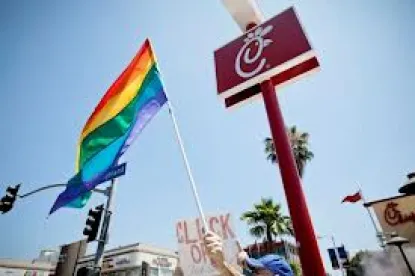One of the hottest topics of debate over the past week has been the comments by Dan Cathy, who is the President of the fast food restaurant chain, Chick-Fil-A, about the legal definition of marriage. In an interview on the Ken Coleman Show, Mr. Cathy is reported as saying:
I think we are inviting God's judgment on our nation when we shake our fist at Him and say, 'We know better than you as to what constitutes a marriage,' . . . I pray God's mercy on our generation that has such a prideful, arrogant attitude to think that we have the audacity to define what marriage is about. . . . We are very much supportive of the family -- the biblical definition of the family unit. We are a family-owned business, a family-led business, and we are married to our first wives. We give God thanks for that … We want to do anything we possibly can to strengthen families. We are very much committed to that.
Mr. Cathy’s comments have been reported, discussed, and debated by a number of talking heads on a wide variety of media outlets. They have also spawned Tweets, Facebook entries, blogs, and the like – where people on both sides of the issue have been eager to give their two cents worth about Chick-Fil-A and the issue of same-sex marriage in general. Most famously, Mr. Cathy’s comments led to statements by Chicago Mayor Rahm Emanuel and Boston Mayor Thomas Menino to the effect that they will block Chick-Fil-A from building a restaurant in their respective cities. Those comments, in turn, have led to even more debate over free speech concerns and whether Mr. Emanuel and Mr. Menino are respecting the First Amendment.
We all have our own personal views regarding the legalization of same-sex marriage; much like abortion, gun control, and the death penalty, it’s a political hot-button issue that divides the country and one about which people tend to feel strongly, one way or the other. When a company’s key executive comes out (pun intended) in favor or against a hot button issue, there is going to be fallout. People are going to disagree with that opinion, and depending on their views, may boycott the company and its stores. According to some recent polls, as much as 54% of the American public now supports the legalization of same-sex marriage . . . which means that Mr. Cathy may have alienated as much as 54% of his potential customer base by his remarks.
It is this fallout that presents the problem from a franchise system point of view. If you are a franchisor, you have a responsibility to your entire franchise system to maximize sales through building goodwill (or, at the very least, you have a responsibility to not create “bad will” for the system). When you make political statements in a public forum on any controversial issue, you can hurt your brand’s goodwill because when you pick a side, you are necessarily alienating those of your potential or actual customers that happen to disagree with you. Can you afford to do that? Are you in business to take sides, or are you in business to do business?
If you are a franchisee, the Chick-Fil-A situation presents a different kind of problem: you as the independent business owner can be hurt if your potential customers decide to stop visiting your franchise because of the position taken by your franchisor’s executive. This is why it’s important as a franchisee to ensure that you carefully evaluate your franchisor and its executives. Does your franchisor or its executives have a history of political, religious, or social commentary or activism? If so, are there any potential risks for negative publicity or public fallout for the brand or system? In the case of Chick-Fil-A, it is widely known that the company is “among only a handful of large American companies with conservative religion built into its corporate ethos;” as a result, one can presume that its franchisees were aware of, and accepted, the risks when they bought their businesses.
It remains to be seen whether the Chick-Fil-A situation will help or hurt the company’s business in the long run. In either case, however, the franchise world should use the controversy as a learning opportunity for the future.



 />i
/>i

